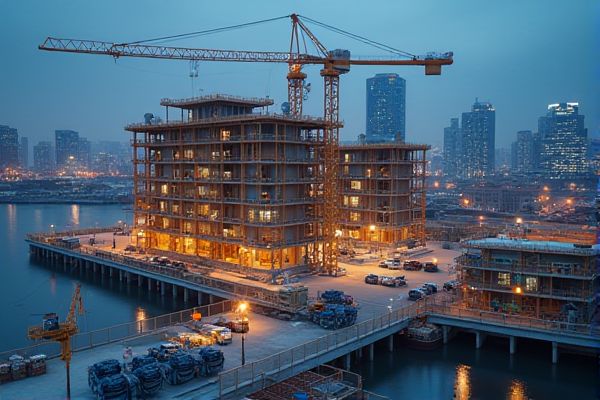
AI significantly enhances construction design by streamlining the planning process through advanced modeling techniques. Machine learning algorithms analyze vast amounts of data from past projects, optimizing resource allocation and identifying potential project risks early. Generative design tools, powered by AI, create numerous design alternatives based on specified parameters, allowing architects and engineers to explore innovative solutions efficiently. Automated project management systems improve collaboration and communication among teams, ensuring deadlines are met and budgets are adhered to.
AI usage in construction design
Building Information Modeling (BIM)
AI can enhance building design efficiency through advanced Building Information Modeling (BIM) techniques. For example, AI algorithms can analyze design data to optimize layouts and material usage. This capability reduces the time for project development and lowers costs. Moreover, integrating AI in BIM may lead to improved collaboration among stakeholders, increasing the chance of successful project outcomes.
Automated Design Optimization
AI usage in construction design can lead to significant efficiencies through automated design optimization. It has the potential to reduce material waste and enhance project timelines, making it an attractive option for firms like Bechtel. By leveraging algorithms, architects can explore numerous design alternatives quickly, which might lead to innovative solutions that align with client needs. This adaptability could present a competitive advantage in an industry increasingly focused on sustainability and cost-effectiveness.
Predictive Maintenance
AI usage in construction design can enhance efficiency by automating complex tasks and optimizing resource allocation. Predictive maintenance allows for the identification of potential equipment failures before they occur, which can reduce downtime and maintenance costs. Companies like Turner Construction are exploring these technologies to improve project outcomes and extend the lifespan of machinery. These advancements could lead to substantial cost savings and increased safety on job sites.
Smart Material Selection
AI can significantly enhance construction design by optimizing the selection of smart materials. For instance, using AI algorithms, architects can analyze data on material properties, sustainability, and cost-effectiveness to make informed choices. This approach not only improves structural performance but also reduces environmental impact. Companies like Autodesk are already implementing these AI-driven strategies, showcasing the potential advantages in modern construction practices.
Energy Efficiency Analysis
AI usage in construction design can significantly enhance efficiency by optimizing structural designs and material selection. For example, tools like Autodesk's Revit can analyze energy efficiency and suggest improvements that reduce operational costs. The integration of AI in energy efficiency analysis presents opportunities for better resource allocation and reduced waste. These advancements could lead to more sustainable practices in the construction industry.
Generative Design Tools
Generative design tools in construction leverage AI to create numerous design alternatives based on specified parameters. These tools can enhance project efficiency by optimizing material usage, reducing waste, and streamlining workflows. Companies like Autodesk have developed platforms that allow architects to explore creative designs while considering constraints and regulations. The potential for faster project turnaround and cost savings presents a significant advantage in the competitive construction industry.
Construction Site Monitoring
AI can significantly improve efficiency in construction design by optimizing resource allocation and reducing waste. By leveraging predictive analytics, construction firms can anticipate potential issues on-site, enhancing safety and productivity. AI-driven monitoring systems can also provide real-time insights, helping project managers swiftly address any discrepancies. For example, firms using Autodesk's design tools may find increased accuracy and reduced project timelines, ultimately leading to cost savings.
Risk Assessment and Management
AI can enhance construction design by optimizing resource allocation and improving structural integrity assessments. In risk assessment, machine learning algorithms can analyze vast datasets to predict potential hazards, allowing for proactive measures. For instance, using AI models similar to those developed by Autodesk can streamline safety evaluations. This integration increases the likelihood of completing projects on time and within budget while minimizing accidents.
Cost Estimation Accuracy
AI can significantly improve cost estimation accuracy in construction design by analyzing historical data and project specifications. For instance, using tools like Autodesk can enhance budget forecasts by identifying potential overruns early. Improved accuracy can reduce financial risk, allowing companies to allocate resources more effectively. This advantage opens up possibilities for better project planning and increased competitiveness in the market.
Project Scheduling Enhancement
AI can enhance project scheduling in construction design by analyzing historical data for better time estimation. Companies like Autodesk are already utilizing AI to predict potential delays and resource allocation. This could lead to increased efficiency and reduced costs, allowing projects to stay within budget. Implementing AI tools may offer a competitive advantage in meeting tight deadlines and optimizing workflows.
 techknowy.com
techknowy.com